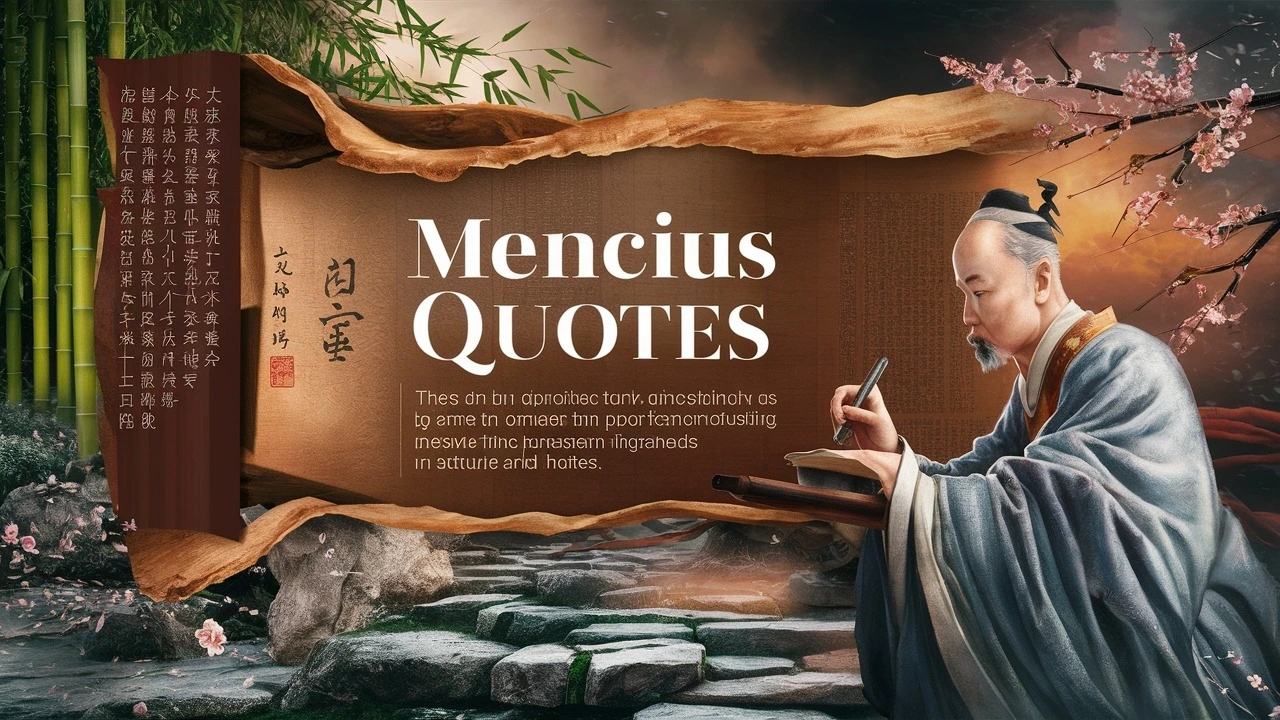This blog post explores some of the most insightful Mencius Quotes, offering explanations to help readers understand the depth and relevance of his wisdom.
Mencius, also known as Mengzi or Meng Ke, was a Chinese philosopher who is considered the most famous Confucian after Confucius himself. His thoughts and teachings have profoundly influenced Chinese culture and philosophy.
On Human Nature
“The great man is he who does not lose his child’s heart.”
Author: Mencius
Description:
This quote emphasizes the importance of maintaining innocence, curiosity, and a sense of wonder throughout life.
“All men have a mind which cannot bear to see the sufferings of others.”
Author: Mencius
Description:
Mencius believed in the inherent goodness of human nature, suggesting that empathy is a fundamental human trait.
“Benevolence is the distinguishing characteristic of man.”
Author: Mencius
Description:
This quote highlights the belief that kindness and benevolence are what set humans apart from other beings.
“The feeling of commiseration is the beginning of benevolence.”
Author: Mencius
Description:
Mencius argues that the ability to feel compassion is the root of all benevolent actions.
“The feeling of shame and dislike is the beginning of righteousness.”
Author: Mencius
Description:
A sense of shame and aversion to wrong acts forms the basis of moral integrity and righteousness.
“The feeling of respect and reverence is the beginning of propriety.”
Author: Mencius
Description:
Mencius teaches that respect and reverence are foundational to proper conduct and societal harmony.
“The feeling of right and wrong is the beginning of wisdom.”
Author: Mencius
Description:
Recognizing and discerning right from wrong is the initial step toward acquiring wisdom.
“He who loves others is constantly loved by them. He who respects others is constantly respected by them.”
Author: Mencius
Description:
This quote underscores the reciprocal nature of love and respect in human relationships.
“The heart of compassion is the seed of benevolence; the heart of shame, of righteousness; the heart of courtesy, of propriety; the heart of right and wrong, of wisdom.”
Author: Mencius
Description:
Mencius outlines the foundational emotions that lead to the cultivation of key virtues.
“The root of the state is in the family. The root of the family is in the person of its head.”
Author: Mencius
Description:
This quote emphasizes the importance of personal and familial integrity as the foundation for a stable and just society.
On Leadership
“The ruler must first be virtuous himself, then he can transform others.”
Author: Mencius
Description:
Mencius believed that a leader’s virtue is crucial for influencing and guiding their subjects.
“The people are the most important element in a nation; the spirits of the land and grain are next; the sovereign is the lightest.”
Author: Mencius
Description:
This quote reflects Mencius’s belief in the primacy of the people’s well-being over the ruler’s authority.
“He who exerts his mind to the utmost knows his nature. Knowing his nature, he knows Heaven.”
Author: Mencius
Description:
Mencius suggests that a leader who understands themselves and their nature will align with the will of Heaven.
“To act without understanding, and to do so habitually without examination, following certain courses all their lives without knowing the reasons why, this is the way of multitudes.”
Author: Mencius
Description:
Leaders should act with knowledge and understanding rather than blindly following routines.
“The man who moves others to act as he does is a leader.”
Author: Mencius
Description:
True leadership involves inspiring others to follow one’s example.
“A ruler who neglects what is essential will lack what is necessary.”
Author: Mencius
Description:
Leaders must focus on fundamental principles to ensure their governance is effective and just.
“The way of a great man is wide and open; the way of a small man is narrow and self-interested.”
Author: Mencius
Description:
This quote contrasts the broad-mindedness of great leaders with the narrow focus of lesser individuals.
“A great man does not lose his heart of a child.”
Author: Mencius
Description:
Effective leaders retain a sense of innocence, curiosity, and compassion.
“When Heaven is about to confer a great office on any man, it first exercises his mind with suffering.”
Author: Mencius
Description:
Adversity is seen as a preparatory phase for those destined for great leadership.
“The sovereign cannot make his will supreme; he must put himself in the place of the people.”
Author: Mencius
Description:
This quote emphasizes the importance of empathy and understanding the people’s perspective in leadership.
On Education
“The object of learning is not only to seek knowledge but to cultivate virtue.”
Author: Mencius
Description:
Education should focus on moral and ethical development as well as intellectual growth.
“Learning without thought is labor lost; thought without learning is perilous.”
Author: Mencius
Description:
Effective learning requires both acquiring knowledge and critical thinking.
“If the scholar is not grave, he will not call forth any veneration, and his learning will not be solid.”
Author: Mencius
Description:
Seriousness and dedication are necessary for scholarly respect and genuine learning.
“The path of duty lies in what is near, and men seek for it in what is remote.”
Author: Mencius
Description:
True education and ethical behavior start with immediate and practical actions rather than distant ideals.
“To feed a man without teaching him is to breed a thief.”
Author: Mencius
Description:
Providing for someone’s physical needs without educating them leads to moral and societal issues.
“He who finds the way in the morning may die in the evening without regret.”
Author: Mencius
Description:
Understanding one’s purpose or path in life brings fulfillment, regardless of life’s duration.
“There is no greater delight than to be conscious of sincerity on self-examination.”
Author: Mencius
Description:
Self-awareness and sincerity bring profound personal satisfaction and peace.
“The mind of the superior man is conversant with righteousness; the mind of the mean man is conversant with gain.”
Author: Mencius
Description:
Education should cultivate a focus on righteousness rather than material gain.
“He who works for the sake of others and their profit, and not for the sake of himself and his gain, is called virtuous.”
Author: Mencius
Description:
True virtue involves selflessness and working for the benefit of others.
“The scholar who cherishes the love of comfort is not fit to be deemed a scholar.”
Author: Mencius
Description:
A true scholar must be willing to endure discomfort and challenges in the pursuit of knowledge and virtue.
On Morality
“To nourish the mind, there is nothing better than to make the desires few.”
Author: Mencius
Description:
Simplifying one’s desires is key to mental and moral cultivation.
“The feeling of benevolence is the highest state of morality.”
Author: Mencius
Description:
Genuine benevolence represents the pinnacle of moral behavior.
“If you love men, and they are not benefited; it is a case of benevolence without authority.”
Author: Mencius
Description:
Benevolence must be coupled with effective action and authority to be truly beneficial.
“The great man is he who does not lose his child’s heart.”
Author: Mencius
Description:
Maintaining a pure and innocent heart is essential to moral greatness.
“The object of the superior man is truth.”
Author: Mencius
Description:
The pursuit of truth is the primary goal of a morally upright individual.
“Righteousness is the road; propriety is the door.”
Author: Mencius
Description:
Morality involves following the path of righteousness and adhering to proper conduct.
“Virtue is the root; wealth is the result.”
Author: Mencius
Description:
Moral virtue should be the foundation, with material success being a secondary outcome.
“In the way of the superior man, there are four things, to not be idle even in solitude, to be upright even in poverty, to not deviate from his principles even in danger, and to never forget his words even when surrounded by temptations.”
Author: Mencius
Description:
The superior man maintains moral integrity in all circumstances.
“The superior man is firm in the right way, and not easily led astray.”
Author: Mencius
Description:
A morally superior individual is steadfast and not easily influenced by wrong paths.
“The benevolent man extends his love to others.”
Author: Mencius
Description:
True morality involves extending kindness and fairness to all.
On Justice
“Benevolence, righteousness, propriety, and wisdom are not infused into us from without. We are certainly made by Heaven to possess them.”
Author: Mencius
Description:
These virtues are inherent in human nature and should be cultivated from within.
“The way of Heaven is to bless the good and to punish the wicked.”
Author: Mencius
Description:
Justice aligns with the natural order of rewarding good and punishing evil.
“A ruler who does not cultivate virtue will lose the support of his people.”
Author: Mencius
Description:
Just leadership is crucial for maintaining the support and loyalty of the populace.
“The superior man is just and fair in his dealings.”
Author: Mencius
Description:
Moral superiority is demonstrated through just and fair interactions with others.
“He who does not act according to the rules of propriety is not a truly superior man.”
Author: Mencius
Description:
Adherence to proper conduct is essential for being considered morally superior.
“To see what is right and not to do it is want of courage.”
Author: Mencius
Description:
Recognizing justice and failing to act on it is a sign of cowardice.
“The benevolent man extends his love to others.”
Author: Mencius
Description:
Justice involves extending kindness and fairness to all.
“The way of Heaven is to bless the good and to punish the wicked.”
Author: Mencius
Description:
Justice aligns with the natural order of rewarding good and punishing evil.
“A ruler who neglects justice will lack the support of the people.”
Author: Mencius
Description:
Just leadership is crucial for maintaining the support and loyalty of the populace.
“The superior man is just and fair in his dealings.”
Author: Mencius
Description:
Moral superiority is demonstrated through just and fair interactions with others.
On Society
“The root of the state is in the family. The root of the family is in the person of its head.”
Author: Mencius
Description:
Societal stability and integrity start with strong, virtuous families and leaders.
“When people are educated, the distinctions between classes disappear.”
Author: Mencius
Description:
Education helps to bridge social divides and promote equality.
“The people are the most important element in a nation; the spirits of the land and grain are next; the sovereign is the lightest.”
Author: Mencius
Description:
The well-being of the people should be prioritized over the ruler’s authority.
“To feed a man without teaching him is to breed a thief.”
Author: Mencius
Description:
Providing education along with material support is crucial for societal well-being.
“In good times, people respect virtue; in bad times, they respect laws.”
Author: Mencius
Description:
People’s respect for virtue fluctuates with their circumstances, emphasizing the need for both moral and legal frameworks.
“The superior man understands what is right; the inferior man understands what will sell.”
Author: Mencius
Description:
Moral understanding should take precedence over commercial interests in a well-functioning society.
“When people are one with their ruler, they will die for their country.”
Author: Mencius
Description:
Unity between the ruler and the people fosters loyalty and dedication to the nation.
“A ruler who does not cultivate virtue will lose the support of his people.”
Author: Mencius
Description:
Virtuous leadership is essential for maintaining the people’s trust and support.
“The well-being of the people is the highest law.”
Author: Mencius
Description:
Ensuring the people’s well-being should be the primary focus of governance.
“To love the people and protect their interests is the ruler’s foremost duty.”
Author: Mencius
Description:
A ruler’s main responsibility is to care for and safeguard the interests of the people.
On Governance
“Govern the people with regulations and keep order among them with punishments, and they will flee from you and lose all self-respect.”
Author: Mencius
Description:
Excessive regulation and punishment lead to resentment and a lack of self-respect among the people.
“Lead them with virtue and keep them in line with the rites, and they will have a sense of shame and will become good.”
Author: Mencius
Description:
Governance through virtue and proper conduct fosters a sense of shame and moral improvement.
“The way of a great ruler is wide and open; the way of a petty ruler is narrow and self-interested.”
Author: Mencius
Description:
Great rulers are broad-minded and altruistic, while petty rulers are narrow and self-serving.
“A benevolent man loves others; a wise man knows others.”
Author: Mencius
Description:
Governance should involve both benevolence and wisdom in dealing with the people.
“The people are the water and the ruler is the boat. Water can support a boat, and water can also overturn a boat.”
Author: Mencius
Description:
The ruler’s power depends on the people’s support, which can also be withdrawn.
“To put the world in order, we must first put the nation in order; to put the nation in order, we must first put the family in order; to put the family in order, we must first cultivate our personal life; we must first set our hearts right.”
Author: Mencius
Description:
Effective governance starts with personal integrity and extends to family, nation, and the world.
“When a ruler’s heart is right, his government will be fair.”
Author: Mencius
Description:
The fairness of a government reflects the moral integrity of the ruler.
“Good government is achieved through the right way of governing, not through force.”
Author: Mencius
Description:
Effective governance is based on correct principles rather than coercion.
“The superior man governs people by law; the inferior man governs people by punishment.”
Author: Mencius
Description:
Governance should rely on just laws rather than harsh punishments.
“The wise ruler knows that his power comes from the people’s trust.”
Author: Mencius
Description:
A ruler’s legitimacy and power are derived from the trust and support of the people.
On Self-Cultivation
“Self-reflection brings wisdom.”
Author: Mencius
Description:
Regular self-reflection is essential for personal growth and wisdom.
“To nourish the mind, there is nothing better than to make the desires few.”
Author: Mencius
Description:
Simplifying one’s desires helps in mental cultivation and clarity.
“The superior man is modest in his speech but exceeds in his actions.”
Author: Mencius
Description:
True virtue is demonstrated through actions rather than boastful words.
“He who conquers himself is the mightiest warrior.”
Author: Mencius
Description:
Personal mastery and self-discipline are the greatest forms of strength.
“The man who moves others to act as he does is a leader.”
Author: Mencius
Description:
Leading by example is a powerful form of influence.
“The mind of the superior man is conversant with righteousness; the mind of the mean man is conversant with gain.”
Author: Mencius
Description:
A superior person’s focus is on righteousness, while an inferior person’s focus is on material gain.
“There is no greater delight than to be conscious of sincerity on self-examination.”
Author: Mencius
Description:
Personal satisfaction and peace come from sincere self-awareness.
“The path of duty lies in what is near, and men seek for it in what is remote.”
Author: Mencius
Description:
True self-cultivation starts with immediate, practical actions rather than distant ideals.
“The feeling of respect and reverence is the beginning of propriety.”
Author: Mencius
Description:
Respect and reverence are foundational to proper conduct and self-cultivation.
“He who works for the sake of others and their profit, and not for the sake of himself and his gain, is called virtuous.”
Author: Mencius
Description:
True virtue involves selflessness and working for the benefit of others.
On Love and Compassion
“All men have a mind which cannot bear to see the sufferings of others.”
Author: Mencius
Description:
Mencius believed in the inherent goodness of human nature, suggesting that empathy is a fundamental human trait.
“The feeling of commiseration is the beginning of benevolence.”
Author: Mencius
Description:
Compassion is the root of all benevolent actions.
“The benevolent man loves others.”
Author: Mencius
Description:
True benevolence involves extending love and kindness to others.
“He who loves others is constantly loved by them.”
Author: Mencius
Description:
Love begets love, highlighting the reciprocal nature of human relationships.
“The heart of compassion is the seed of benevolence.”
Author: Mencius
Description:
Compassion is the starting point for developing benevolence.
“Benevolence is the distinguishing characteristic of man.”
Author: Mencius
Description:
Kindness and benevolence are what set humans apart from other beings.
“The feeling of right and wrong is the beginning of wisdom.”
Author: Mencius
Description:
Recognizing and discerning right from wrong is the initial step toward acquiring wisdom.
“To love the people and protect their interests is the ruler’s foremost duty.”
Author: Mencius
Description:
A ruler’s main responsibility is to care for and safeguard the interests of the people.
“Benevolence is the highest state of morality.”
Author: Mencius
Description:
Genuine benevolence represents the pinnacle of moral behavior.
“The feeling of benevolence is the highest state of morality.”
Author: Mencius
Description:
Genuine benevolence represents the pinnacle of moral behavior.
On Wisdom
“The feeling of right and wrong is the beginning of wisdom.”
Author: Mencius
Description:
Recognizing and discerning right from wrong is the initial step toward acquiring wisdom.
“The feeling of commiseration is the beginning of benevolence.”
Author: Mencius
Description:
Compassion is the root of all benevolent actions and leads to wisdom.
“The mind of the superior man is conversant with righteousness; the mind of the mean man is conversant with gain.”
Author: Mencius
Description:
A superior person’s focus is on righteousness, while an inferior person’s focus is on material gain.
“The superior man understands what is right; the inferior man understands what will sell.”
Author: Mencius
Description:
Wisdom involves understanding and pursuing what is morally right over what is commercially beneficial.
“Learning without thought is labor lost; thought without learning is perilous.”
Author: Mencius
Description:
Effective learning requires both acquiring knowledge and critical thinking.
“Self-reflection brings wisdom.”
Author: Mencius
Description:
Regular self-reflection is essential for personal growth and wisdom.
“The scholar who cherishes the love of comfort is not fit to be deemed a scholar.”
Author: Mencius
Description:
A true scholar must be willing to endure discomfort and challenges in the pursuit of knowledge and wisdom.
“To find the way in the morning may die in the evening without regret.”
Author: Mencius
Description:
Understanding one’s purpose or path in life brings fulfillment, regardless of life’s duration.
“The path of duty lies in what is near, and men seek for it in what is remote.”
Author: Mencius
Description:
True wisdom starts with immediate, practical actions rather than distant ideals.
“The object of learning is not only to seek knowledge but to cultivate virtue.”
Author: Mencius
Description:
Education should focus on moral and ethical development as well as intellectual growth.










